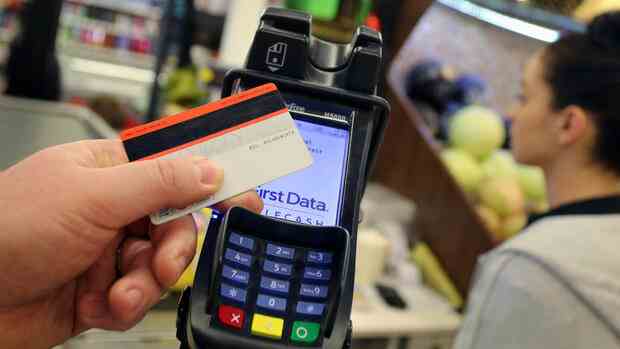The proportion of card payments is increasing in most countries in the euro zone – including Germany.
(Photo: dpa)
Frankfurt During the corona pandemic, cash payments were downright frowned upon in many places. Coins and bills, the most common means of payment, were considered unhygienic. Many people were concerned that it could transmit viruses. The latest study by the European Central Bank (ECB) on payment behavior in the euro zone sheds light on the extent to which the pandemic has changed payment behavior.
A total of around 50,000 people were surveyed in the 19 countries of the euro zone, both in 2021 and 2022. In addition, selected participants had to document their payment behavior themselves.
1. Cash suffers a setback at the cash register
It is true that in the 19 countries of the euro zone, bills and coins are usually used to pay at the tills. But the proportion of cash payments in all transactions fell to 59 percent in 2022, as the European Central Bank (ECB) announced on Tuesday. Three years earlier the proportion was 72 percent, six years earlier it was 79 percent.
In terms of turnover, card payments have surpassed cash payments for the first time. According to ECB data, 46 percent of sales at the till were paid by card and 43 percent in cash. The different proportion of cash payments is due to the fact that small amounts are more often paid in cash, while large amounts are more often paid with a bank or credit card. The remaining payments were made, for example, by vouchers or by invoice.
Top jobs of the day
Find the best jobs now and
be notified by email.
The results of the survey illustrate the ongoing trend towards fewer cash payments at the till. This is all the more true because consumers are increasingly shopping online. The share of e-commerce payments in all payments rose to 17 percent in 2022. Three years earlier it was six percent. In terms of sales, the share even grew from 14 to 28 percent.
2. How the pandemic affected payment behavior
The corona pandemic has accelerated the decline in cash payments. One in three of those surveyed said they used coins and notes to pay a little less or much less than before the pandemic. 54 percent did not change their payment behavior, while 14 percent paid in cash more often.
However, the main reason for this is not the fear of a virus infection, which only every fourth cash opponent cites. Most people consider electronic payment to be more convenient (58 percent) or respond to urgent requests not to pay in cash (42 percent).
3. Germany: Cash no longer most popular
The Germans are actually known to be big fans of cash. Measured against this, however, card payments have gained considerably in popularity. 41 percent prefer to pay with bank cards or otherwise electronically. Payments with the Girocard, formerly known as the “EC card”, are the most popular. Cash payment is only the preferred option for 30 percent.
Just two years ago, Germany, along with Austria, Malta and Cyprus, was one of the few countries where cash payments were ahead – in Germany with a share of 43 percent. Only the Cypriots have become even more unfaithful to cash.
More on the subject:
There are six countries where consumers pay more cash at the checkout than Germans: Portugal, Spain, Italy, Austria, Slovenia and Malta. If you take sales as a benchmark, Germany even ranks at the lower end of the cash payer scale.
The Austrians are completely different: in the Alpine republic, the proportion of cash fans has risen by three percentage points to 45 percent. Cash payments are also gaining popularity in France, Belgium and Estonia, albeit from a much lower starting point.
4. The cash option is still important to a majority
However, the majority of Europeans do not want to do without cash. For 60 percent of consumers in the euro zone, having the option to pay in cash is either very important or fairly important. At the top of the cash fans are Germans and Austrians. In Germany, the cash payment option is very important or fairly important to 69 percent of those surveyed, and 66 percent in Austria.
In Germany, the proportion of people who consider a cash option to be completely unimportant was the smallest in Europe at seven percent. The average for the euro zone is 12 percent.
5. Crypto is in demand – but hardly as a means of payment
A small proportion of Europeans have ventured into cryptocurrencies – despite the fall in prices or before. After all, four percent of those surveyed stated that they hold cryptoassets. In Germany, too, it was four percent, and in Luxembourg and Slovenia it was even eight percent. However, most consumers see cryptocurrencies as an investment vehicle and not as a possible means of payment.
More: Cash is being replaced in Brazil by the Pix payment system



